Unit 8 Natural disasters Reading课件(共33张PPT,内嵌视频) 2024-2025学年牛津译林版八年级英语上册
文档属性
| 名称 | Unit 8 Natural disasters Reading课件(共33张PPT,内嵌视频) 2024-2025学年牛津译林版八年级英语上册 | 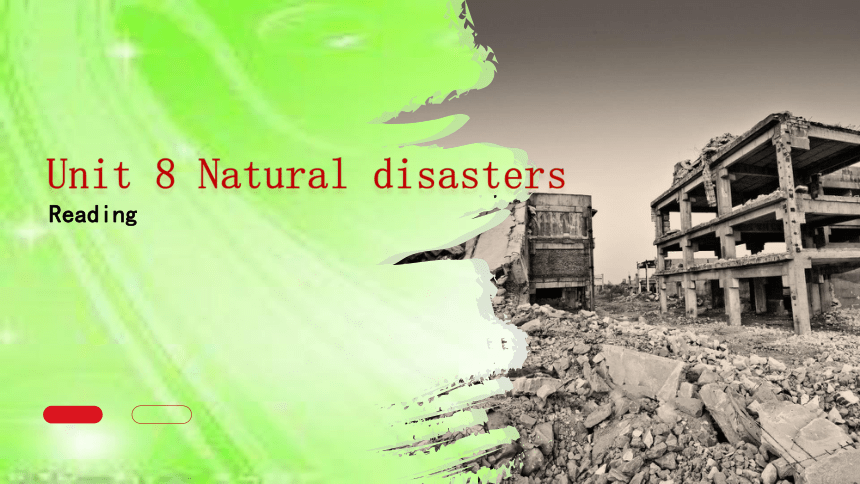 | |
| 格式 | pptx | ||
| 文件大小 | 172.6MB | ||
| 资源类型 | 教案 | ||
| 版本资源 | 牛津译林版 | ||
| 科目 | 英语 | ||
| 更新时间 | 2024-08-10 18:07:03 | ||
图片预览

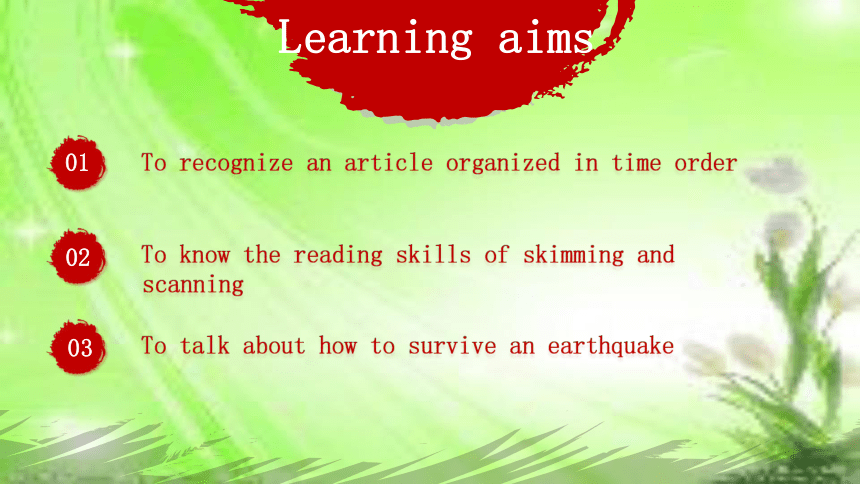
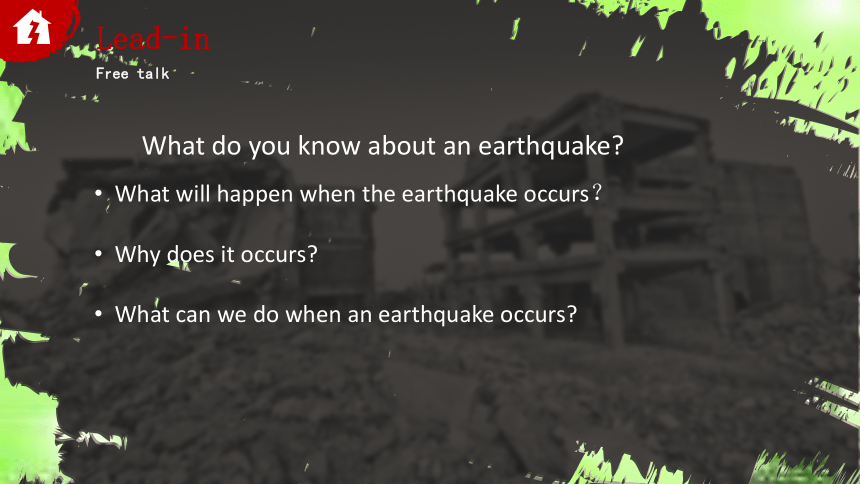
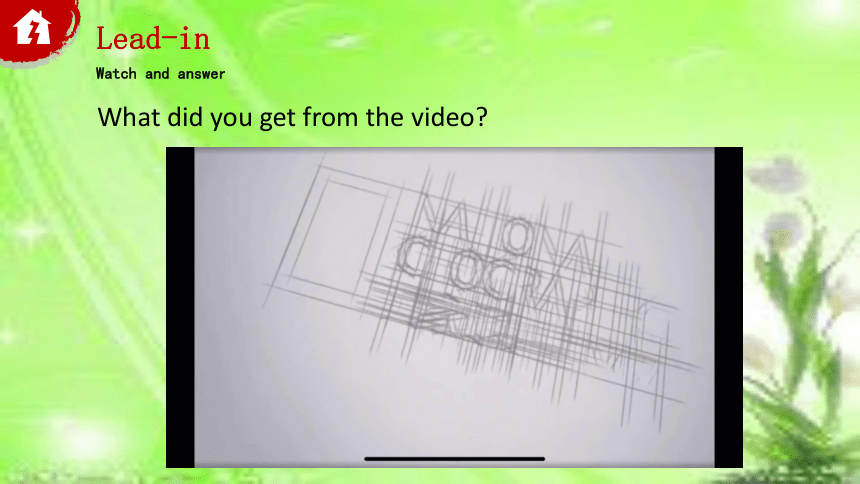
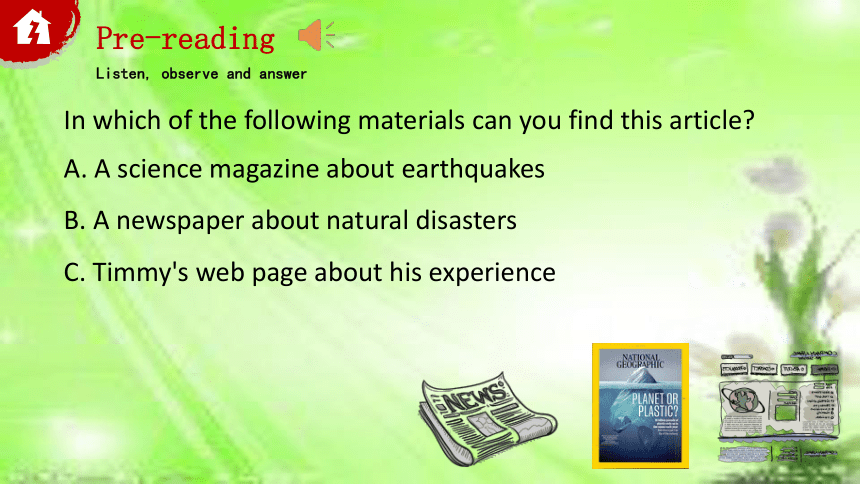

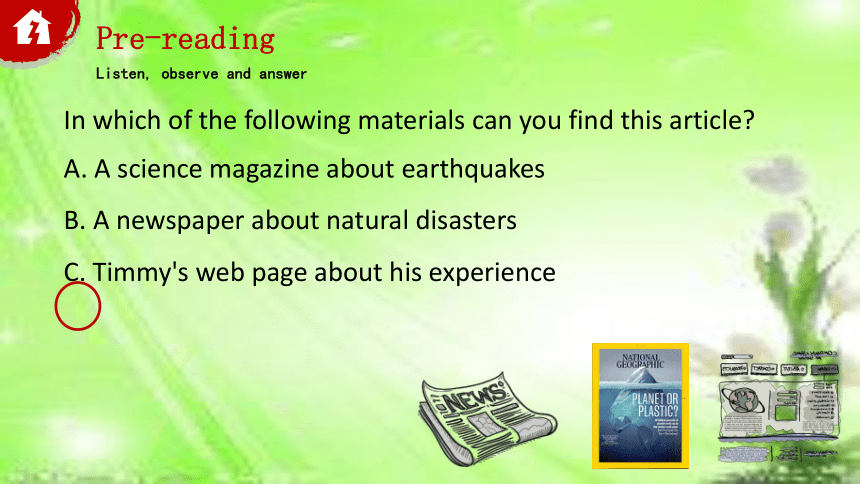
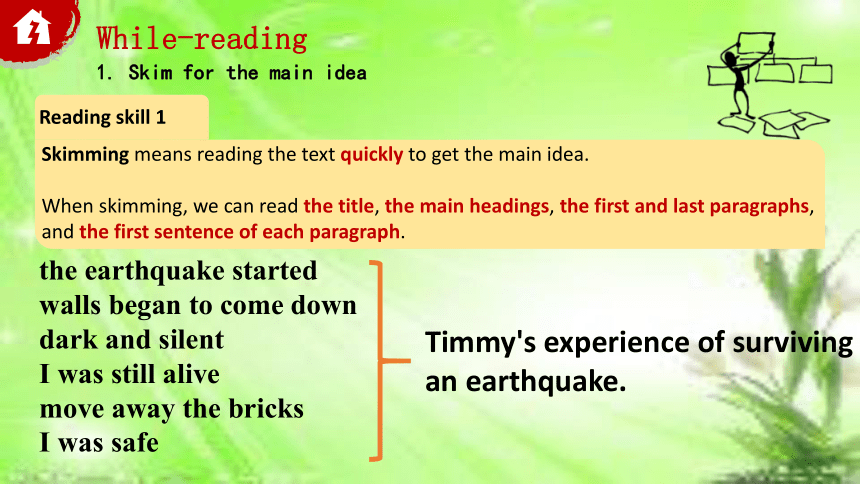
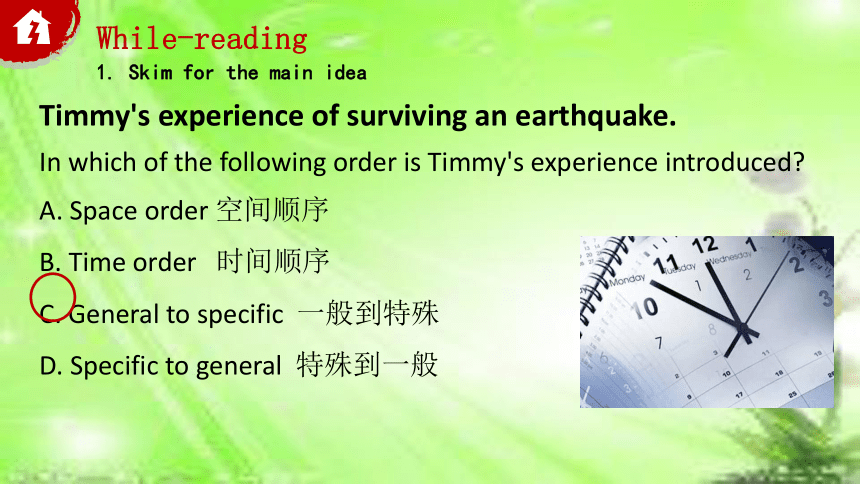
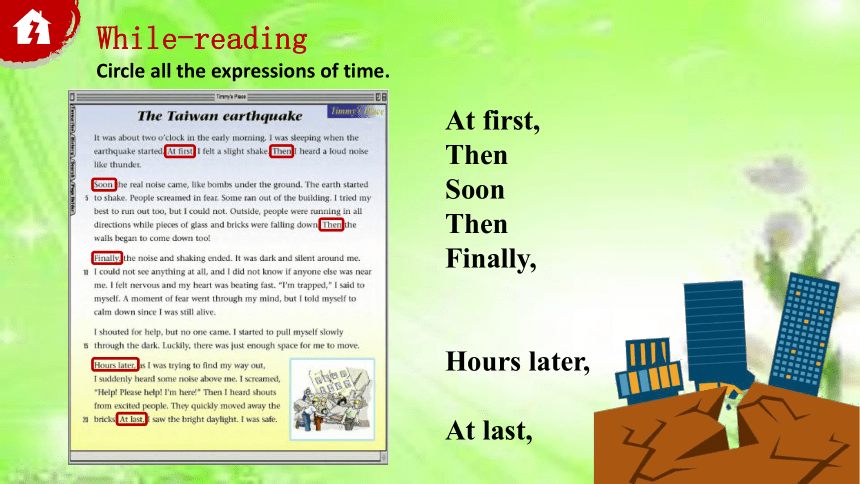


文档简介
Unit 8 Natural disasters
Reading
Learning aims
01
To recognize an article organized in time order
02
To know the reading skills of skimming and scanning
03
To talk about how to survive an earthquake
Lead-in
Free talk
What do you know about an earthquake?
What will happen when the earthquake occurs?
Why does it occurs?
What can we do when an earthquake occurs?
Lead-in
Watch and answer
What did you get from the video?
Pre-reading
Listen, observe and answer
In which of the following materials can you find this article?
A. A science magazine about earthquakes
B. A newspaper about natural disasters
C. Timmy's web page about his experience
Pre-reading
Look at P94 and P95
Timmy's place
web page
Pre-reading
Listen, observe and answer
In which of the following materials can you find this article?
A. A science magazine about earthquakes
B. A newspaper about natural disasters
C. Timmy's web page about his experience
While-reading
1. Skim for the main idea
Reading skill 1
Skimming means reading the text quickly to get the main idea.
When skimming, we can read the title, the main headings, the first and last paragraphs, and the first sentence of each paragraph.
the earthquake started
walls began to come down
dark and silent
I was still alive
move away the bricks
I was safe
Timmy's experience of surviving an earthquake.
While-reading
1. Skim for the main idea
Timmy's experience of surviving an earthquake.
In which of the following order is Timmy's experience introduced?
A. Space order 空间顺序
B. Time order 时间顺序
C. General to specific 一般到特殊
D. Specific to general 特殊到一般
While-reading
Circle all the expressions of time.
At first,
Then
Soon
Then
Finally,
Hours later,
At last,
While-reading
P95 Write the correct caption in the blank under each picture.
I screamed for help.
Some people ran out of the building.
I saw the bright daylight.
The earth started to shake.
I was trapped.
The walls came down.
While-reading
Put the pictures in the correct order.
2
5
6
1
4
3
While-reading
2. Scan for detailed information
Reading skill 2
Scanning means moving our eyes quickly over the text to look for specific information such as names or numbers.
We don't need to read every word. Instead, we look for the key information that will answer our questions.
Scan para. 02 for what Timmy felt, heard and saw.
{5C22544A-7EE6-4342-B048-85BDC9FD1C3A}Feelings
Sounds
Events
While-reading
2. Scan for detailed information
Scan para. 02 for what Timmy felt, heard and saw.
{5C22544A-7EE6-4342-B048-85BDC9FD1C3A}Feelings
Sounds
Events
a _____ shake
The earth started to ______.
a loud noise like
________
the real noise came, like ______ under the ground
______ of _____ and _______ were falling down
_____ began to come down
slight
shake
thunder
bombs
pieces
glass
bricks
walls
The earthquake became _________________.
more and more serious
While-reading
2. Scan for detailed information
Scan para. 02 for how people acted.
People _________________________.
Some __________________________.
People _________________________.
Scan para. 03 for how Timmy felt.
He felt ____________________.
He _______________________.
screamed in fear
ran out of the building
were running in all direction
nervous and afraid
calmed down later
Timmy became _____________.
calmer and calmer
While-reading
2. Scan for detailed information
Scan para. 04 & 05 for how Timmy was survived.
He shouted for help.
He started to pull himself slowly though the dark.
He screamed after he heard some noise above him.
People moved away the bricks and saved Timmy.
shouted pull screamed moved away
After-reading
Discuss in pairs:
What can we learn from Timmy?
e.g. 1. Stay calm.
2. Try to find way out.
.
.
.
Further-thinking
Discuss in pairs:
What to prepare before an earthquake?
? money
? water
? food
? flashlight
? jewellery
? homework
? whistle
? switch
? phone
Further-thinking
Discuss in pairs:
How to survive an earthquake?
? Drop your hands and knees
? Cover your head with your arms
? Hold onto heavy funiture
? Keep driving a car
? Run as soon as the earthquake stops
? Cover your mouth
Language
points
02
1. Who will mop up the water if I go home without you?
mop n. 拖把 v. 用拖把擦/拖 干净
mop up 把……拖干净
它的宾语如果是代词,则代词必须放在up前。 mop it up 把它拖干净。
eat up drink up clean up
e.g. 地板湿了。比尔,把它拖干净。
典型例题
The floor is wet. Mop it up, Bill.
2. I felt a slight shake.
The earth started to shake.
shake n. 摇动,震动,可数名词 v. 摇动
e.g. 我摇了一下钱包, 掉出一枚硬币。
I gave my purse a shake, and a coin fell out.
服药前先将药瓶摇一摇。
Shake the bottle before taking the medicine.
e.g. 他摇了摇头表示拒绝。
He refused with a ______ (shake)of the head.
The house ______ (shake) when a train goes by.
典型例题
shake
shakes
shake off 逃脱,摆脱
shake hands with sb. 和某人握手
3. I could not see anything at all, and I did not know if anyone else was near me.
(1)not…at all 根本不,一点也不
e.g. 今天我一点儿也不忙。
I am not busy at all today.
not at all还可以用于以下情况:
(1)用于回答感谢,意为“不用谢;不客气”。
e.g. — Thank you very much. — Not at all.不客气。
e.g. — You are very kind. — Not at all.哪里,哪里。
(3)用于回答道歉,意为“没关系”。
e.g. — I'm sorry I'm late.— Oh, not at all, please come in.
噢,没关系,请进来。
(2)if 引导的句子充当宾语,表示“是否”时,没有主将从现
e.g. Do you know if the singer will come to our school tomorrow?
你知道那个明星下个星期是否会来吗?
if 引导条件状语从句,表示“如果”时,有主将从现
e.g. If he writes to me, I'll let you know.
如果他写信给我,我会让你知道的。
注意辨析:
1. Who will mop up the water up if I go home without you?
2. I did not know if anyone else was near me.
前一句是:_______________
后一句是:_______________
条件状语从句
宾语从句
—I want to know if Mr Green ______ here tomorrow.
—If he _______, I’ll tell you.
A. comes, comes B. will come, will come
C. will come, comes D. comes, will come
典型例题
我不知道明天他是否会来。如果他来,我打电话给你。
I don’t know if he _________(come) tomorrow. If he ______(come), I'll call you.
will come
comes
4. A moment of fear went through my mind, ...
mind n. 思想,精神,理智
表示“感知”意思是不可数名词;
表示“智力”是可数名词;也可表示“有才智的人”,为可数名词
e.g. ___________ think alike. 英雄所见略同。
Concentrate your mind on study. Don't look around.
集中精力学习,不要东张西望。
Great minds
【知识拓展】
change one's mind 改变主意
make up one's mind (to do sth) 下决心(做某事)
keep sth. in mind 记住……
5. ..., but I told myself to calm down since I was still alive.
alive adj. 活着的;存在的,修饰人或物时一般后置。
e.g. The fish is alive./ people alive/keep the fish alive
alive, living与lively
1) living adj. 活的,逼真的,可指人或物一般前置。
e.g. living people/My first teacher is still living.
2) lively adj. 活泼的,有生机的;精力充沛的。
e.g. Jenny is a lively girl.
He makes his class lively.
make a living 谋生
make a / one's living by doing sth. 通过干……谋生
The old man stayed ______ luckily after the strong earthquake.
2. — In Chinese culture, children born in the Year of the Monkey are said to be smart.
— Yes. They are always full of energy, so I think they are also ____.
A. honest B. generous C. lively D. modest
alive
典型例题
用作动词时,mind主要有下列意思:
(1) vt. 注意;留心
e.g. If you don't mind, you'll be hurt. 如果你不小心,你会受伤的。
(2) vt. 介意;反对
e.g. 我并不介意开玩笑,但这玩笑太过分了。
I don't __________, but this is going too far.
你介意我打开窗户吗?
Do you mind if I open the window?
= Do you mind _________________?
(3) vt. 专心于;从事
Mind your own businesss.
mind a joke
mind sth. 介意某事
mind sb. doing sth. 介意某人做某事
my opening the window
管好你自己的事情。
6. Try to get out as soon as possible.
as…as possible 尽可能…… = as…as you can
e.g. 请尽可能地告诉我更多的信息。
Please give me _______________________.
请尽可能经常复习功课。
Please go over your lessons ______________.
男孩们尽可能快得向终点跑去。
The boys ran to the finishing line ____________________.
as much information as possible
as often as possible
典型例题
as fast as possible/they could
巩固练习
1. First, she felt a s_____ shaking through his body.
2. When the earthquake started, the children ran in every d________.
3. This is not a dead cat. It is still a_____.
4. After being t_________ in the dark room for a long time , she was helped out at last.
5. The students looked at each other in f_____ when the earthquake happened.
6. They were ___________ (讨论) the project with their teacher at this time yesterday afternoon.
7. Mum ________ (拖) all the floors up in our house this morning.
8. Luckily Mr Zhang _________ (幸存) the earthquake.
9. ________ (shake) hands with others can show your kindness.
10. Would you m________ telling me what you're doing here?
slight
direction
alive
trapped
fear
discussing
mopped
survived
Shaking
ming
( ) 1. I don't?mind?_____ scared, so I've made up my?mind?______ the horror film.
A. feeling; to watch B. feeling; watching C. to feel; to watch D. to feel; watching
( ) 2. —?Do the dishes, Mike, or I will tell mum! —?_______, Sue!
A.?You are welcome B.?Mind?your own business
C.?It's my duty D. Never?mind
( ) 3. Jin?Yong is?one of the greatest?and?oldest ______ writers. He is still ______.
A. living;?alive B. living; living C.?alive; living D.?alive;?alive
( ) 4. When the earthquake hit the country, lots of houses ______.
A. broke down B. came dow C. went down D. calmed down
( ) 5. The floor is so clean. Who ______ this morning?
A. mopped up it B. mopped it up C. mop up it D. mops it up
A
B
B
巩固练习
A
B
Thanks for listening
Reading
Learning aims
01
To recognize an article organized in time order
02
To know the reading skills of skimming and scanning
03
To talk about how to survive an earthquake
Lead-in
Free talk
What do you know about an earthquake?
What will happen when the earthquake occurs?
Why does it occurs?
What can we do when an earthquake occurs?
Lead-in
Watch and answer
What did you get from the video?
Pre-reading
Listen, observe and answer
In which of the following materials can you find this article?
A. A science magazine about earthquakes
B. A newspaper about natural disasters
C. Timmy's web page about his experience
Pre-reading
Look at P94 and P95
Timmy's place
web page
Pre-reading
Listen, observe and answer
In which of the following materials can you find this article?
A. A science magazine about earthquakes
B. A newspaper about natural disasters
C. Timmy's web page about his experience
While-reading
1. Skim for the main idea
Reading skill 1
Skimming means reading the text quickly to get the main idea.
When skimming, we can read the title, the main headings, the first and last paragraphs, and the first sentence of each paragraph.
the earthquake started
walls began to come down
dark and silent
I was still alive
move away the bricks
I was safe
Timmy's experience of surviving an earthquake.
While-reading
1. Skim for the main idea
Timmy's experience of surviving an earthquake.
In which of the following order is Timmy's experience introduced?
A. Space order 空间顺序
B. Time order 时间顺序
C. General to specific 一般到特殊
D. Specific to general 特殊到一般
While-reading
Circle all the expressions of time.
At first,
Then
Soon
Then
Finally,
Hours later,
At last,
While-reading
P95 Write the correct caption in the blank under each picture.
I screamed for help.
Some people ran out of the building.
I saw the bright daylight.
The earth started to shake.
I was trapped.
The walls came down.
While-reading
Put the pictures in the correct order.
2
5
6
1
4
3
While-reading
2. Scan for detailed information
Reading skill 2
Scanning means moving our eyes quickly over the text to look for specific information such as names or numbers.
We don't need to read every word. Instead, we look for the key information that will answer our questions.
Scan para. 02 for what Timmy felt, heard and saw.
{5C22544A-7EE6-4342-B048-85BDC9FD1C3A}Feelings
Sounds
Events
While-reading
2. Scan for detailed information
Scan para. 02 for what Timmy felt, heard and saw.
{5C22544A-7EE6-4342-B048-85BDC9FD1C3A}Feelings
Sounds
Events
a _____ shake
The earth started to ______.
a loud noise like
________
the real noise came, like ______ under the ground
______ of _____ and _______ were falling down
_____ began to come down
slight
shake
thunder
bombs
pieces
glass
bricks
walls
The earthquake became _________________.
more and more serious
While-reading
2. Scan for detailed information
Scan para. 02 for how people acted.
People _________________________.
Some __________________________.
People _________________________.
Scan para. 03 for how Timmy felt.
He felt ____________________.
He _______________________.
screamed in fear
ran out of the building
were running in all direction
nervous and afraid
calmed down later
Timmy became _____________.
calmer and calmer
While-reading
2. Scan for detailed information
Scan para. 04 & 05 for how Timmy was survived.
He shouted for help.
He started to pull himself slowly though the dark.
He screamed after he heard some noise above him.
People moved away the bricks and saved Timmy.
shouted pull screamed moved away
After-reading
Discuss in pairs:
What can we learn from Timmy?
e.g. 1. Stay calm.
2. Try to find way out.
.
.
.
Further-thinking
Discuss in pairs:
What to prepare before an earthquake?
? money
? water
? food
? flashlight
? jewellery
? homework
? whistle
? switch
? phone
Further-thinking
Discuss in pairs:
How to survive an earthquake?
? Drop your hands and knees
? Cover your head with your arms
? Hold onto heavy funiture
? Keep driving a car
? Run as soon as the earthquake stops
? Cover your mouth
Language
points
02
1. Who will mop up the water if I go home without you?
mop n. 拖把 v. 用拖把擦/拖 干净
mop up 把……拖干净
它的宾语如果是代词,则代词必须放在up前。 mop it up 把它拖干净。
eat up drink up clean up
e.g. 地板湿了。比尔,把它拖干净。
典型例题
The floor is wet. Mop it up, Bill.
2. I felt a slight shake.
The earth started to shake.
shake n. 摇动,震动,可数名词 v. 摇动
e.g. 我摇了一下钱包, 掉出一枚硬币。
I gave my purse a shake, and a coin fell out.
服药前先将药瓶摇一摇。
Shake the bottle before taking the medicine.
e.g. 他摇了摇头表示拒绝。
He refused with a ______ (shake)of the head.
The house ______ (shake) when a train goes by.
典型例题
shake
shakes
shake off 逃脱,摆脱
shake hands with sb. 和某人握手
3. I could not see anything at all, and I did not know if anyone else was near me.
(1)not…at all 根本不,一点也不
e.g. 今天我一点儿也不忙。
I am not busy at all today.
not at all还可以用于以下情况:
(1)用于回答感谢,意为“不用谢;不客气”。
e.g. — Thank you very much. — Not at all.不客气。
e.g. — You are very kind. — Not at all.哪里,哪里。
(3)用于回答道歉,意为“没关系”。
e.g. — I'm sorry I'm late.— Oh, not at all, please come in.
噢,没关系,请进来。
(2)if 引导的句子充当宾语,表示“是否”时,没有主将从现
e.g. Do you know if the singer will come to our school tomorrow?
你知道那个明星下个星期是否会来吗?
if 引导条件状语从句,表示“如果”时,有主将从现
e.g. If he writes to me, I'll let you know.
如果他写信给我,我会让你知道的。
注意辨析:
1. Who will mop up the water up if I go home without you?
2. I did not know if anyone else was near me.
前一句是:_______________
后一句是:_______________
条件状语从句
宾语从句
—I want to know if Mr Green ______ here tomorrow.
—If he _______, I’ll tell you.
A. comes, comes B. will come, will come
C. will come, comes D. comes, will come
典型例题
我不知道明天他是否会来。如果他来,我打电话给你。
I don’t know if he _________(come) tomorrow. If he ______(come), I'll call you.
will come
comes
4. A moment of fear went through my mind, ...
mind n. 思想,精神,理智
表示“感知”意思是不可数名词;
表示“智力”是可数名词;也可表示“有才智的人”,为可数名词
e.g. ___________ think alike. 英雄所见略同。
Concentrate your mind on study. Don't look around.
集中精力学习,不要东张西望。
Great minds
【知识拓展】
change one's mind 改变主意
make up one's mind (to do sth) 下决心(做某事)
keep sth. in mind 记住……
5. ..., but I told myself to calm down since I was still alive.
alive adj. 活着的;存在的,修饰人或物时一般后置。
e.g. The fish is alive./ people alive/keep the fish alive
alive, living与lively
1) living adj. 活的,逼真的,可指人或物一般前置。
e.g. living people/My first teacher is still living.
2) lively adj. 活泼的,有生机的;精力充沛的。
e.g. Jenny is a lively girl.
He makes his class lively.
make a living 谋生
make a / one's living by doing sth. 通过干……谋生
The old man stayed ______ luckily after the strong earthquake.
2. — In Chinese culture, children born in the Year of the Monkey are said to be smart.
— Yes. They are always full of energy, so I think they are also ____.
A. honest B. generous C. lively D. modest
alive
典型例题
用作动词时,mind主要有下列意思:
(1) vt. 注意;留心
e.g. If you don't mind, you'll be hurt. 如果你不小心,你会受伤的。
(2) vt. 介意;反对
e.g. 我并不介意开玩笑,但这玩笑太过分了。
I don't __________, but this is going too far.
你介意我打开窗户吗?
Do you mind if I open the window?
= Do you mind _________________?
(3) vt. 专心于;从事
Mind your own businesss.
mind a joke
mind sth. 介意某事
mind sb. doing sth. 介意某人做某事
my opening the window
管好你自己的事情。
6. Try to get out as soon as possible.
as…as possible 尽可能…… = as…as you can
e.g. 请尽可能地告诉我更多的信息。
Please give me _______________________.
请尽可能经常复习功课。
Please go over your lessons ______________.
男孩们尽可能快得向终点跑去。
The boys ran to the finishing line ____________________.
as much information as possible
as often as possible
典型例题
as fast as possible/they could
巩固练习
1. First, she felt a s_____ shaking through his body.
2. When the earthquake started, the children ran in every d________.
3. This is not a dead cat. It is still a_____.
4. After being t_________ in the dark room for a long time , she was helped out at last.
5. The students looked at each other in f_____ when the earthquake happened.
6. They were ___________ (讨论) the project with their teacher at this time yesterday afternoon.
7. Mum ________ (拖) all the floors up in our house this morning.
8. Luckily Mr Zhang _________ (幸存) the earthquake.
9. ________ (shake) hands with others can show your kindness.
10. Would you m________ telling me what you're doing here?
slight
direction
alive
trapped
fear
discussing
mopped
survived
Shaking
ming
( ) 1. I don't?mind?_____ scared, so I've made up my?mind?______ the horror film.
A. feeling; to watch B. feeling; watching C. to feel; to watch D. to feel; watching
( ) 2. —?Do the dishes, Mike, or I will tell mum! —?_______, Sue!
A.?You are welcome B.?Mind?your own business
C.?It's my duty D. Never?mind
( ) 3. Jin?Yong is?one of the greatest?and?oldest ______ writers. He is still ______.
A. living;?alive B. living; living C.?alive; living D.?alive;?alive
( ) 4. When the earthquake hit the country, lots of houses ______.
A. broke down B. came dow C. went down D. calmed down
( ) 5. The floor is so clean. Who ______ this morning?
A. mopped up it B. mopped it up C. mop up it D. mops it up
A
B
B
巩固练习
A
B
Thanks for listening
